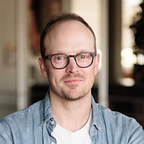Reading on the job
At the start of 2019, the Everyhow team made a commitment to read at least 12 books together.
Now, this isn’t just another touchy-feely book club or a ‘look at us, we read books!’ humble-brag sort of thing. It’s a genuine part of our desire to make learning an intrinsic part of how we work, and to extract practical value from smart, experienced people who look at the world in a unique way.
The truth is, I love books and always have. But I struggle to make the time to read, let alone make sense of what I read, or work out how to apply any learnings.
So in line with the Everyhow philosophy of devising highly methodical, productive and collaborative ways of doing things, this is how we’ve approached reading as a team:
- At the start of the year, we chose 12 books from a long list we’ve been collating. These are the books we’re itching to read, and those that feel most relevant to where we’re at as a business today. Many of our choices have been inspired by reading lists from prolific readers like Bill Gates, Shane Parrish, Ryan Holiday and Tim Ferriss.
- We purchased the chosen few as actual, physical books, and have them staring at us on the office bookshelf as a constant reminder, alongside our existing collection of yet-to-be-read books. Individually, we also bought Kindle and Audible versions so we can all read/listen at the same time, and read more easily on-the-go.
- We try to make time to read whilst in the office or as part of our respective commutes, everyday. At the very least, we’re trying to normalise reading as an intrinsic part of work, not just a downtime or personal time thing. In line with the 5-hour-rule, we’re aiming for this to be part of our ‘hour a day’ of deliberate learning. Full disclosure: we’re a way off achieving this goal yet.
- We commit to working our way through each book methodically, one-by-one, together. As we do this, we make notes in the physical and Kindle books, highlighting everything and anything that resonates. We also make notes and jot down ideas in the form of open questions — such as ‘what if we created a co-design activity around this?’ or ‘how might we inspire people to ask more questions?’.
- We set a target number of chapters to read in a given week, then meet on a Friday for 1–2 hours, and attempt to individually document all of our insights and ideas from those chapters. We then spend some time discussing the insights that really stand out and ideas we want to carry forward. Our method? Post-it notes (of course), followed by a spot of affinity mapping.
- The best insights and ideas make their way onto three lists; research, quick wins and big questions. Research should be self explanatory - the topics, methods, companies and/or people we are keen to learn more about. Quick wins are things we are keen to try or implement quickly; they get prioritised and then we chip away at them each week. When it comes to the ‘big questions’ — we’ve allocated time to make progress on one of these each month.
- Our final step is to collate, categorise and digitise our favourite passages or quotes into our version of something called a commonplace book. We’re using a great little app called Notion as our weapon of choice for this. The key here is easy access and ‘searchability’ — we want this to be a practical resource we can reference on a daily basis.
Now, we won’t be limiting ourselves to 12 books, we just need a realistic and achievable starting point. In fact, my plan is to read double or triple that amount this year personally — I might just need to give-up my Netflix account as fellow strategist Amanda Gordon did to start her journey of reading 50 books a year.
So, without further ado, here’s our 2019 reading list:
- A More Beautiful Question: The Power of Inquiry to Spark Breakthrough Ideas by Warren Berger
- Learn Better: Mastering the Skills for Success in Life, Business, and School, or, How to Become an Expert in Just About Anything by Ulrich Boser
- Let My People Go Surfing by Yvon Chouinard (Patagonia)
- Atomic Habits by James Clear
- Anything You Want: 40 Lessons for a New Kind of Entrepreneur by Derek Sivers
- The Opposable Mind by Roger Martin
- Blitzscaling by Reid Hoffman
- Antifragile by Nassim Nicholas Taleb
- Brave New Work by Aaron Dignan
- The Checklist Manifesto by Atul Gawande
- Principles by Ray Dalio
- The Hard Thing About Hard Things by Ben Horowitz
You can also find our these, together with our long list on a trello board here.
If you’ve got any book recommendations or alternative ‘team reading’ approaches, we’d love to hear from you!
If you’re looking for book inspiration and tips on how to make your reading count, here’s some of our favourite lists and articles:
Reading Lists
- Farnham Street Reading list
- Do Lectures — 100 Must-Read Books Of 2018
- Ryan Holiday’s ‘books to base your life on’
- Boundless — Book Recommendations For Knowledge Workers To Go Deeper
Make your reading count
